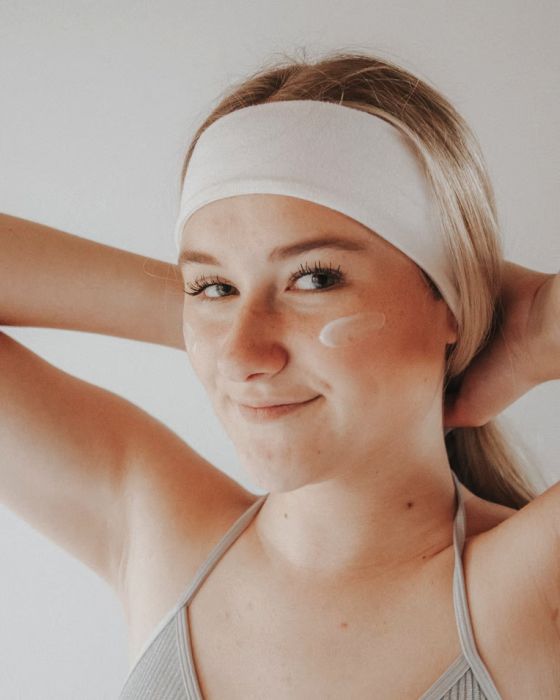Skin that doesn’t get enough moisture can feel dry, uncomfortably tight, or even rough to the touch. It might also flake and get in the way of smooth make-up application, turning your usual routine into a whole ordeal. To prepare for the cold and harsh winter, you should look at some underrated and lesser-known skincare ingredients.
According to skincare experts from Woman in The Moon, heavy-hitting moisturizing ingredients are the only thing that will bring relief to dry and cracked skin. Hyaluronic acid, squalane, and ceramides tend to get a lot of praise, but others don’t get nearly as much credit.
Glycerin is highly hydrating and has a lasting effect. CBD oil may help reduce inflammation and be helpful if you’re fighting an unequal battle with acne or eczema. Retinol recently started trending again due to its anti-ageing benefits. Oils like tea tree oil or grapeseed oil have been on the rise. Vitamin C prevents premature ageing, including visible fine lines, wrinkles, dark spots, and more.
Continue reading to learn more about underrated skincare ingredients that should be on your radar this winter.
Glycerin
Glycerin is a humectant, which means it can attract and retain moisture from the environment to keep your skin hydrated. It’s a common ingredient in lotions, creams, and serums because it provides long-lasting moisture without feeling sticky or heavy. As a bonus, glycerin can also help with acne and eczema. If you have oily skin, be careful as glycerin tends to be heavy and can cause breakouts.
CBD Oil
CBD oil may be trending for recreational purposes, but it’s also beneficial for your skin. It is derived from cannabidiol, a cannabinoid found in hemp and cannabis plants. CBD oil has anti-inflammatory and antioxidant properties and may help reduce redness and swelling for those dealing with acne or eczema.
Retinol
Retinol is an active form of vitamin A that promotes healthy skin cell turnover and boosts collagen production. Most people think of retinol as an anti-ageing ingredient, but it can also help treat acne and sunspots.
It doesn’t work instantly, but you should see reduced fine lines and wrinkles, smaller pores, and a brighter complexion over time. If your skin is sensitive, start with a pea-sized amount every two days until your skin gets used to it, and watch out for irritation or redness.
Aloe Vera
Aloe vera is well-known for its ability to heal irritated or burned tissues, thanks to its soothing properties. Aloe vera contains amino acids, enzymes, minerals, vitamins — all of which have different benefits for your skin!
Thanks to its antioxidant content, it prevents UV light from damaging your skin cells by inhibiting lipid peroxidation. Additionally, aloe vera gel helps promote healthy collagen production thanks to its vitamin A content. Finally, aloe vera gel contains salicylic acid, promoting exfoliation thanks to its antibacterial properties.
Tea Tree Oil
Tea tree oil is known for its antibacterial properties that help keep blemishes at bay. It offers antimicrobial benefits that kill off acne-causing bacteria while reducing inflammation. This oil can also help fade scars and prevent future breakouts by clearing pores of dirt and dead skin cells. Rooibos tea tree oil is beneficial for anyone who deals with acne or even just dry skin.
Grapeseed Oil
Grapeseed oil is a multi-functional product that can be used on any body area that needs hydration. It’s packed with antioxidants that help improve the appearance of fine lines and scars. Besides, it has a low molecular weight which means it enters the skin quickly and doesn’t sit on top of the skin like some other oils do. It also applies smoothly and absorbs quickly into your skin without leaving a greasy residue behind.
Hyaluronic Acid
Hyaluronic acid is the ultimate heavy hitter when it comes to skincare. This ingredient is a powerhouse at drawing moisture from the air and locking it into the skin. It’s an incredibly effective humectant. On top of that, it lends a soft, cushiony texture to the skin and helps fill in tiny lines and uneven texture.
It makes a fantastic moisturizer for those with dry skin. The only downside is that hyaluronic acid can sometimes be sticky or tacky, but you can typically remedy that by adding a lightweight oil to the formula. Some examples of oils to mix with your hyaluronic acid serum include squalane, marula oil, and hemp seed oil.
Vitamin C
It’s a powerful antioxidant that helps fight free radicals in your body that can cause premature ageing. Vitamin C also helps your body produce collagen, which is what gives our skin structure. It can even help reduce visible signs of ageing in your skin by increasing fibroblast production, helping your skin produce more collagen.
Collagen keeps your skin firm and elastic, which prevents sagging or wrinkling. Vitamin C can also help fade dark spots in the skin caused by sun exposure or other factors over time.
Conclusion
There are many excellent skincare ingredients that you may not have heard of before. From CBD oil and glycerin to vitamin C and tea tree oil — all of them can help you keep your skin as good-looking as possible. Nonetheless, it’s essential to do your research and find out if they’re right for you!
If you feel like your skin lacks moisture, give some of these underrated skincare ingredients a try. You can always try incorporating several different products into your skincare routine to see if the results are better than using just one. And, if you have some doubts about using a specific ingredient, you can always consult your St George dermatologist whether it will be beneficial for you or not.

